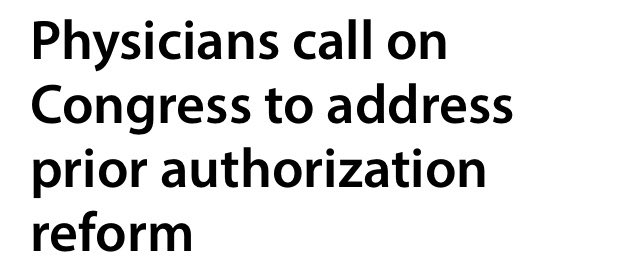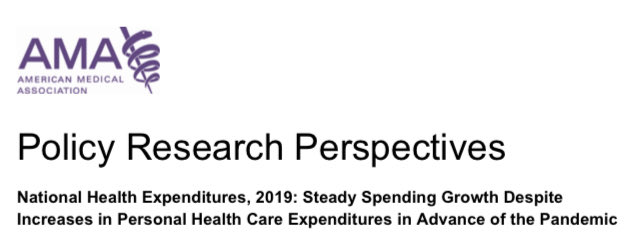
1/ @AmerMedicalAssn press release on the urgency to #fixpriorauth:
At the height of the #COVID19 #pandemic, physicians reported being bedeviled by unnecessary, bureaucratic obstacles that the health insurance industry pledged to reduce three years ago.
At the height of the #COVID19 #pandemic, physicians reported being bedeviled by unnecessary, bureaucratic obstacles that the health insurance industry pledged to reduce three years ago.

2/ The data highlights the urgent need for new bipartisan legislation introduced in the House, the Improving Seniors’ Timely Access to Care Act. [TY @RepDelBene @MikeKellyPA @RepBera @RepLarryBucshon for introducing this vital measure.]
[See data here: ama-assn.org/system/files/2…]
[See data here: ama-assn.org/system/files/2…]
3/#OurAMA-conducted survey shows physicians are running into roadblocks because of #priorauthorization, the process of requiring health care professionals to obtain advance approval from health plans before a prescription medication or medical service is delivered to the patient.
4/ 1,000 practicing physicians surveyed in Dec 2020—when new COVID-19 cases were soaring—reported that #priorauthorization was widespread. 83% of respondents indicated that prior authorizations for prescription medications & medical services have increased over the past 5 years.
5/ Along with this increased volume of requirements, most physicians reported a continued lack of transparency in #priorauthorization programs. A majority stated it is difficult to determine whether a prescription medication (68%) or medical service (58%) requires prior auth.
6/ This grim reality persists despite the fact that three years ago, the @AmerMedicalAssn and other large health organizations signed a consensus statement that was intended to improve the #priorauthorization process: ama-assn.org/sites/ama-assn…
7/ @AmerMedicalAssn, along with @ahahospitals, America’s Health Insurance Plans, American Pharmacists Association, Blue Cross Blue Shield Association, and @MGMA, agreed to reforms needed to reduce #priorauthorization burdens and enhance patient-centered care.
8/ “You would think insurers would ease bureaucratic demands throughout a #pandemic to ensure patients’ access to timely, medically necessary care. Sadly, you would be wrong,” said AMA President @subailey.
9/ Given the insurance industry’s lack of progress in voluntarily reducing the burdens of #priorauthorization agreed to in the consensus statement, @AmerMedicalAssn is calling on #Congress to remedy the problem.
10/ The Improving Seniors’ Timely Access to Care Act (HR 3173) takes direct aim at the insurance industry’s foot-dragging and would codify much of the consensus statement.
For a copy of the bill, see: delbene.house.gov/uploadedfiles/…
For a copy of the bill, see: delbene.house.gov/uploadedfiles/…
11/ This bipartisan legislation would require Medicare Advantage (MA) plans to implement a streamlined electronic #priorauthorization process that complies with technical standards developed by @HHSGov, in consultation with relevant stakeholders.
12/ In addition, the bill would require increased #transparency for beneficiaries and providers, as well as enhance oversight by the @CMSGov on the processes used for #priorauthorization.
13/ Moreover, to ensure that routinely approved care and treatments are not subjected to unnecessary delays, the program would provide for real-time decisions by an MA plan with respect to certain #priorauthorization requests.
14/ Importantly, the bill would also require MA plans to meet beneficiary protection standards, such as ensuring continuity of care when patients change plans.
15/ AMA strongly supports Improving Seniors’ Timely Access to Care Act. The data released…build upon previously published survey results that underscore the significant patient and practice burdens associated with #priorauthorization and the critical need for legislative reform
16/ [Read AMA’s letter of strong support here: searchlf.ama-assn.org/letter/documen…
See AMA 2020 prior auth survey results here: ama-assn.org/system/files/2…]
See AMA 2020 prior auth survey results here: ama-assn.org/system/files/2…]
17/ “There is no room in the patient-physician relationship for insurance-industry barriers. The AMA is dedicated to simplifying & right-sizing #priorauthorization so physicians can properly provide care & patients can receive the timely treatment they deserve,” @subailey said.
18/ “This legislation is a win-win for patients and physicians,” @subailey said.
To learn more and tell your story, visit fixpriorauth.org.
To learn more and tell your story, visit fixpriorauth.org.
• • •
Missing some Tweet in this thread? You can try to
force a refresh







